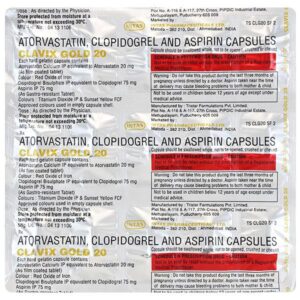CLOPIDOGREL + ATORVASTATIN + ASPIRIN
Clopidogrel: Clopidogrel is a medication used to prevent blood clots in individuals who have had a heart attack, stroke, or peripheral artery disease. It is also prescribed to reduce the risk of blood clots in patients with certain heart conditions or vascular diseases.
The primary mechanism of action of clopidogrel is its antiplatelet activity. It works by inhibiting platelet aggregation, which prevents the formation of blood clots. This is achieved by blocking the P2Y12 adenosine diphosphate receptor on platelet cell membranes, thereby inhibiting the activation of platelets.
The usual recommended dose of clopidogrel is 75 milligrams (mg) per day, taken orally. It can be taken with or without food. The specific dosage may vary depending on the individual’s condition and the prescribing physician’s instructions.
As with any medication, clopidogrel may cause side effects in some individuals. Common side effects include nausea, stomach upset, diarrhea, or abdominal pain. More serious but rare side effects may include severe bleeding, easy bruising, prolonged bleeding after injury or surgery, and allergic reactions such as rash or itching. In some cases, clopidogrel may also lead to a decrease in white blood cell count, which can increase the risk of infections.
It is important to note that clopidogrel may interact with other medications, such as proton pump inhibitors (PPIs), which are commonly prescribed for heartburn or stomach ulcers. PPIs can reduce the effectiveness of clopidogrel by inhibiting its activation in the body, so it is often recommended to avoid using both medications together unless specifically instructed by a healthcare professional.
As always, it is essential to consult with a healthcare provider to ensure the safe and appropriate use of clopidogrel, taking into account an individual’s specific medical history and potential drug interactions.
Atorvastatin: Atorvastatin is a prescription medication that belongs to a class of drugs called statins. It is mainly used to lower the levels of low-density lipoprotein (LDL) cholesterol, commonly referred to as “bad” cholesterol, in the blood. By reducing LDL cholesterol, Atorvastatin helps to decrease the risk of heart attack, stroke, and other cardiovascular diseases.
The drug works by inhibiting an enzyme called HMG-CoA reductase, which plays a crucial role in cholesterol synthesis in the liver. By blocking this enzyme, Atorvastatin reduces the production of cholesterol and increases the liver’s ability to remove LDL cholesterol from the bloodstream.
Atorvastatin is typically taken orally in the form of a tablet. The usual starting dose for most adults is 10 to 20 mg per day, and the maximum recommended daily dose is 80 mg. However, the appropriate dose may vary depending on individual factors such as the patient’s response to treatment and the specific condition being treated. It is important to closely follow the dosing instructions provided by the healthcare professional.
As with any medication, Atorvastatin can cause certain side effects. Common side effects include headache, muscle pain, joint pain, diarrhea, and nausea. In rare cases, more serious side effects may occur, such as liver problems, muscle damage, and an increased risk of diabetes. It is essential to report any unusual symptoms or side effects to a healthcare professional promptly.
It is worth noting that Atorvastatin should not be used during pregnancy or breastfeeding as it may harm the developing fetus or nursing infant. It is also important to avoid consuming grapefruit or grapefruit juice while taking Atorvastatin, as it can increase the risk of side effects.
Overall, Atorvastatin is an effective medication for managing high cholesterol levels. However, it is crucial to consult with a healthcare professional before starting or changing any medication regimen to ensure its safe and proper use.
Aspirin: Aspirin is a widely used medication classified as a nonsteroidal anti-inflammatory drug (NSAID). It is primarily used for pain relief, fever reduction, and to reduce inflammation. Additionally, aspirin is often prescribed for its blood-thinning properties to prevent heart attacks and strokes.
The mechanism of action of aspirin involves inhibiting the production of certain chemicals in the body called prostaglandins. Prostaglandins are involved in pain, inflammation, and fever, so by reducing their production, aspirin helps to relieve these symptoms. Aspirin achieves this by irreversibly inhibiting an enzyme called cyclooxygenase (COX), which is responsible for producing prostaglandins.
The usual dose of aspirin varies depending on the condition being treated. For pain relief and fever reduction, the recommended dose is generally 325-650 mg (1-2 regular-strength tablets) every 4-6 hours as needed, with a maximum daily dose of 4,000 mg. For its blood-thinning properties, the typical dose is lower, around 81-325 mg per day in a long-term preventive regimen.
Like any medication, aspirin can cause side effects. Common side effects include stomach upset, heartburn, nausea, and gastrointestinal irritation. Taking the medication with food or milk can help alleviate these symptoms. Aspirin can also increase the risk of gastrointestinal ulcers and bleeding, especially at higher doses or with long-term use.
In rare cases, aspirin can lead to more serious side effects such as allergic reactions, stomach bleeding, liver problems, or problems with blood clotting. If any of these severe side effects occur, medical attention should be sought immediately.
It is important to note that aspirin should not be given to children or teenagers with fever, flu symptoms, or chickenpox, due to the risk of Reye’s syndrome, a severe but rare condition.
Aspirin can interact with other medications, so it is important to inform your healthcare professional about all the drugs you are taking before starting aspirin therapy.
Overall, aspirin is a versatile medication widely used for pain relief, fever reduction, and its blood-thinning properties. However, it is essential to use it appropriately, considering the recommended dose and potential side effects.


